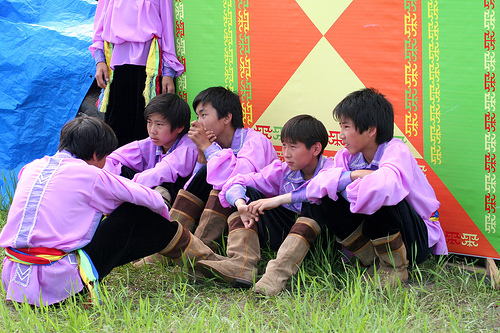Print  |
|


Multilingualism in the Republic of Sakha (Yakutia)
Posted by Natalia Bochkareva on May 30, 2011
By Natalia Bochkareva, Sakha (Yakutia) native, “Arctic Studies” master’s degree student at the university of Versailles – Saint-Quentin-en-Yvelines, France.

marsy1 (cc)
Located in northeastern Siberia, the Republic of Sakha, also known as Yakutia, is the largest republic of Russia. It covers one fifth of the national territory, with a ratio of 3 million km2 for a population… of 949,800 (2009), out of the 142 million (2007) in the whole federation.
Multiethnic republic
Yakutia is one of the most multiethnic regions of the Russian federation with five different indigenous communities: Yakut, Evenki, Even, Yukagir, Chukchi and Dolgan. A land of immigration within the federation, Yakutia is also home to another 120 ethnic groups: Russian, Ukrainian, Tatar, Buryat, Belarusian, Armenian, Bashkir, Azari, etc.
Sakha’s official bilingualism is characterized by the coexistence of two national languages: Sakha (Yakut) and Russian. These two languages are state languages, while the languages of the smaller indigenous communities hold a different yet official status guaranteed by the Constitution of the Republic of Sakha.
Indigenous languages under threat
The recognition of these indigenous languages does not mean that their permanence is ensured. They’re actually suffering steady decline, through a process of assimilation described in these words by linguist Tamara Andreeva (Identity & Language):
– Different dialects among northern peoples. These have led some groups to adopt more common languages in order to facilitate inter-ethnic communication.
– A sparse population in the North with many ethnic groups who speak another language living in close proximity to one another. For example, the Evenk people live in small groups surrounded by different speaking ethnic groups in a vast territory. Thus, neighboring languages have influenced their language and this in turn has disadvantaged the development of their language.
– The dominant role of the Russian language. As the primary means of communication in Russian society, the dominant status of the Russian language influenced the languages of indigenous peoples.
To this last point, probably the most significant, may be added that Russian has become the language of power, being the language of education and that of employment. Thus many people from these communities have deliberately left their mother language behind in hope to access that power.
Also worth noting is the fact that languages of Yakutia have extremely suffered from a time when members of indigenous communities had to live in foster families and study at residential schools, remote from their original environment.
Efforts in education and research
Sakha has adopted several programs since the early 90s meant to increase the number of people who speak indigenous languages, including educational programs encouraging schools to teach these languages.
Nomadic schools for the children of the smaller communities were also created, where both children and parents are welcome in a « nomadic » setting contributing to the safeguard of traditional livelihood and languages.
Educators are trained at the North-Eastern Federal University of Yakutsk.
Also worth mentioning, on the research level, is the Institute of Humanitarian Researches – Siberian Branch of the Russian Academy of Science – exploring the linguistic, ethnographic, and cultural diversity of the Republic of Sakha.
However, despite the educational and research programs, as well as media outreach to minority languages, the issue of the decline of indigenous languages remains the same as the number of their speakers keeps dropping one year after the other. The Republic of Sakha, with its two state languages and other four official languages, faces a crucial challenge: curbing the decline of its indigenous languages to stop the decline of its culture.








